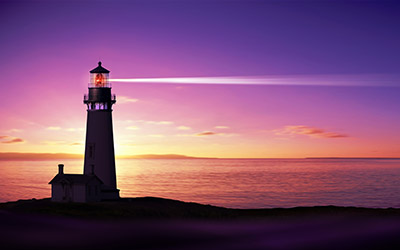
|
Consider those who keep our civilization functioning. In this instance, I’m thinking of lighthouse keepers.
The job these days can mostly be handled by automated systems—and ones that don’t even require all that much computerization. But for centuries, dangerous coastlines and peninsulas that reach out into the sea were guarded by lighthouses that required continuous tending and maintenance. Someone had to polish the lenses when salt spray and haze clouded them. Someone had to be sure the fire had a supply of oil that would last the night, and after the lamp was electrified, this person had to make sure the wiring was good—that salt air again—and the bulb hadn’t burned out. More than that, someone had to make sure the light came on at dusk and lasted till dawn. And now, with all the modern technology involved with shipping, monitor the radio for distress calls, maybe monitor a radar station, and prepare to lend a hand in emergencies.
But consider, also, the basic function of a lighthouse. It shines a light so that ships and sailors without all the modern tools of radar, depth sounders, and global positioning can identify a solid point on land and compare it with their charts. A lighthouse is a signpost, a way station, a fixed star at the edge of the ocean.
The lighthouse keeper is the guardian of that star. This is a person who commits to a function and has no room in his or her soul for doubt, equivocation, or easy excuses. “Well, I don’t see any ship’s running lights on the horizon, so no one’s out there to see my beacon. It doesn’t matter if my light goes out.” Or, “with that storm offshore, the beam won’t penetrate more than a few miles. I might as well not light up tonight.” The lighthouse keeper does not know, and must not care, whether the light will serve its function on this or any other night. The whole point is to be there, to keep up his or her end of the contract.
This is persistence in the absence of hope or expectation. This is faith in mere function. This is the essence of duty. And it’s what keeps communities together and civilization functioning.
Consider other examples: the police who patrol the streets of quiet neighborhoods after midnight, knowing that they won’t likely get a call; the firefighters who come to their station and polish their equipment, waiting out the night in a city of concrete and steel that won’t likely burn; the emergency medical technicians who keep their ambulances stocked and ready to roll in a college town full of healthy young working folks and students who won’t likely need their services; and the librarians who stand at their desks, ready to hand out books, in a population where reading is on the decline and every book, movie, and recording is now available online.
More than that, the soldiers who stand watch and continue their training in foreign outposts where the presumed enemy may never attack; the samurai who work in a garden and yet practice with their weapons every day; and the writers, painters, and musicians who practice their art and keep the faith even when their work does not sell—or not in any great quantity—and they must keep plugging away at their “day jobs.”
I believe it was Woody Allen who said that ninety percent of life is just showing up. I would amend that to ninety percent being just doing what you committed and perhaps were paid to do, even when you can’t see an effect, know your contribution may not be making a difference, and sometimes think your work is wasted effort. This is faith. This is perseverance. This is what keeps the world going round.